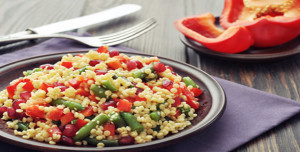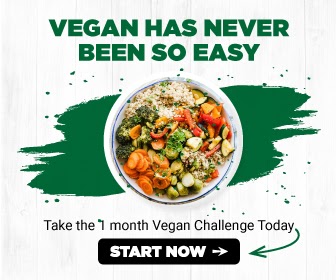 Vegans are people who do not consume animal products – meat, eggs, dairy, or honey. They also do their best to not use other animal-derived ingredients in household or personal care products. Their goal is to reduce – or even eliminate – animal exploitation in their lives.
Vegans are people who do not consume animal products – meat, eggs, dairy, or honey. They also do their best to not use other animal-derived ingredients in household or personal care products. Their goal is to reduce – or even eliminate – animal exploitation in their lives.
People choose to become vegan for different reasons. Most of the time, it is out of concern for the lives of animals, our own health, the state of the earth’s environment, or some combination of those three.
Making the decision to become vegan can feel both empowering and terrifying! How does one make such a huge change? People come to veganism with varying degrees of familiarity with vegan cooking, support from family and friends, and understanding of their nutritional needs.
There is no “right” or “wrong” way to transition to being vegan. Some people become vegan over the course of weeks, months, or years while others become vegan overnight. The best advice is to do what feels right and achievable to you at this point in time. Becoming vegan is an individual journey, and what works well for one person may not ring true for another.
Usually, the first question aspiring vegans have is, “What will I eat?” This is a two-fold question, as it’s important to identify both a person’s nutritional needs and recipes that satisfy their personal tastes.
Regarding nutrition, it is not a particularly complicated issue for most people. The most common sources of vegan protein are soy products (such as tofu and tempeh), beans, nuts, seeds, and wheat gluten (sometimes referred to as wheat-meat or seitan). It is important to eat a wide variety of fruits and vegetables. This advice is equally important to omnivores, but vegans tend to think about it more because their diet is under more scrutiny!
A bit of research online or at the local library should be enough for most new vegans to understand their basic nutritional needs and recognize that if a variety of foods are consumed, they don’t need to obsess over each and every meal. For those with specific health concerns related to diet (e.g., those with celiac disease, diabetes, low iron levels, etc.), it is advisable to consult with a nutritionist who is knowledgeable about veganism. The nutritionist doesn’t have to be vegan but does have to be someone who will actively support the new vegan with sound information and advice.
Figuring out what kinds of meals to prepare can feel overwhelming. But once you have a handful of “go-to” recipes, it will get much easier. It won’t take long before you ask yourself, “What should I have for dinner?” rather than, “What can I make that doesn’t have animal products in it?” Incorporating veganism into the diet will feel natural rather than alien.
Invest in a few vegan cookbooks or visit your local library to borrow vegan cookbooks, and look online to find a wide selection of vegan recipes. When choosing recipes, consider your personal tastes as well as how much time you want to spend preparing food and what kinds of ingredients are readily available at your local supermarket. There are a wide variety of vegan recipes featuring different ethnic cuisines, cooking methods, and ingredients.
Be advised that some products that appear to be vegan may not be vegan at all. There are some “fake meats” and “fake cheeses” that are vegetarian but not vegan. Check all labels for ingredients such as whey, egg whites, casein, and gelatin. You can find extensive lists of animal ingredients by looking online.
While the issue of what to eat each day is the most pressing concern, new vegans face other lifestyle choices as well. For those who own leather, wool, or other animal-derived products, a choice has to be made about what to do with them. Some people donate these items immediately; others cannot afford to buy new vegan items and decide to continue using the non-vegan items they own until they are able to purchase replacement products.
Similar decisions must be made regarding household and personal care items. It may be tempting to simply throw away various cosmetics, lotions, soaps, and cleaning products; but throwing these items in the trash does nothing other than create more waste. It would be preferable to either give these products to someone who will use them or use them yourself and then replace the items with cruelty-free products.
Some people have to decide whether or not they can afford the cruelty-free products, since they often command a higher price. If an aspiring vegan cannot afford the more expensive products, that doesn’t mean they’re not vegan; it is simply a reflection of their economic reality. Vegans do their best to reduce animal exploitation, and our best is not always ideal!
A major challenge can be the lack of support for a new vegan. Some people have supportive families and friends; others have some support, though their families and friends may not really understand their desire to become vegan; others have overtly hostile families and friends.
Seek community and support for your new vegan lifestyle. There are many vegan groups online, but you may also be fortunate enough to live in an area with an active vegan or vegetarian community. These groups can offer information, advice, and camaraderie as you transition to veganism and may continue to play an important role in your life even after you are comfortable and established in your vegan lifestyle.
Becoming vegan is a tremendous journey that benefits you, animals, and the environment. The transition to veganism may include some challenges, but they are all achievable and well worth it. Having some easy-to-prepare, tasty recipes, solid information about your nutritional needs, and a supportive community will make your transition to a vegan lifestyle much easier!
More Articles about Vegan Living
If you are interested in improving your health, helping the environment, and taking a stand against animal cruelty, please visit Vegan Journey for more articles about vegan living by this author.
Article Source: http://EzineArticles.com/?expert=Valerie_Toizer_Bloom

Speak Your Mind